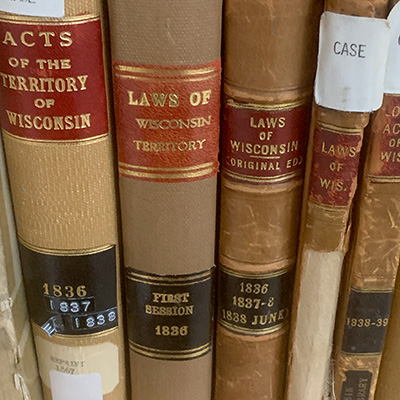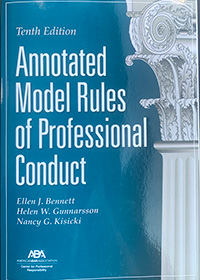WSLL @ Your Service October 2023
Contents
The Past is a Foreign Country - Nate Anderson
On a rainy, dark night on the Tennessee River, Governor Louis Harvey was watching from the deck of the tied-up Dunleith for the steamer Minnehaha. He was to transfer to the steamer and continue back to Wisconsin. "As the bow of 'the Minnehaha' came near, the Governor moved, apparently to get out of the way, and making a misstep, fell overboard between the two boats." Despite frantic rescue efforts by his companions, he sank into the water.
Some children found his body sixty miles downstream. They emptied the governor's pockets of papers and valuables and returned his corpse to the water. After the governor's papers dried out, however, locals realized his identity. They buried him in a "rude grave" on the riverbank, and alerted the US military. Harvey rests today in Madison's Forest Hills Cemetery.

Governor Harvey's fate began with legislation. In the 1860s, the legislature passed laws authorizing the governor to support the U.S. government in the Civil War. The governor assumed duties related to the defense of the state, and was authorized to provide military force for the defense of the United States Government or borrow money to repel an invasion. There were less existential tasks assumed by the governor as well. He had the power to appoint an agent for the purchase of stationary, or approve the purchase of Webster's dictionaries for use in schools. The governor was also authorized to procure certain reporters for the state library, which was later known as the State Law Library.
But it was the duties assumed during the war that led to Harvey's end. His predecessor, Governor Alexander Randall, asked permission from the legislature to travel outside the state. The legislature responded with a $750 travel budget for the governor's office. Governor Harvey used that allotment and left on his mission to bring medical supplies to the Shiloh battlefield shortly after taking office in 1862. That mission for medical supplies led him to the Dunleith, and became his last act as governor.
The Republican Party had chosen a former Democrat, Edward Salomon, as their candidate for Lieutenant Governor because he was pro-war and antislavery. He was an attractive choice as a recent immigrant, who had fled the aftermath of the failed German revolution of 1848. Salomon had never held elected office. He had lived in the U.S. for only thirteen years. With Harvey's death, he now led a state fighting the civil war.
While Governor Salomon supported the war, he favored voluntary enlistment. Forced by President Lincoln's General Order no. 141 to institute an unpopular draft, Salomon lost the support of his immigrant base. Riots broke out. In Dodge County, rioters shot enlistment agents. In Port Washington on November 10, 1862, a mob stoned and prepared to hang the agent, who fled for his life. Salomon pled for federal troops to restore order.
Rioters were detained at Camp Randall in Madison. Lincoln's order had suspended their habeas corpus rights, but the Wisconsin Supreme Court issued the writ to bring prisoner Nicholas Kemp before the court. While the court was sympathetic to Lincoln and the Union effort, in re Kemp followed the lead of Justice Taney's ex parte Merryman, finding the president's unilateral suspension of the writ unconstitutional. Averting a showdown, the Wisconsin court delayed serving the writ for Kemp, and the U.S. paroled the prisoners. Congress granted Lincoln permission to suspend the writ, making the matter moot.
Salomon lost the Republican nomination for governor and failed in a bid for US Senate. He moved to New York City, and then returned to Germany where he lived out his days. In 1927, eight years after his death, Manitowoc erected a monument to honor him and his three brothers, who had served in the war. The large rock with their names still anchors the county courthouse.
References:
- Digest of Wisconsin Laws, 1858-1868.
- Current, Richard N. The History of Wisconsin. Vol. II The Civil War Era, 1848-1873. State Historical Society of Wisconsin, 1976.
- Falch, Susan T. The Port Washington Civil War Draft Riot: National Implications of a Local Disturbance. Master's Thesis, UW-Eau Claire, 2012.
- Thwaites, Reuben Gold. Messages and Proclamations of Wisconsin War Governors. Wisconsin History Commission, 2012. Especially: "Leave of Absence Requested," Gov. Randall, 1861. "Letter Accompanying Governor's Message" regarding the manner of finding of Governor Harvey's body, 1862.
- Manitowoc County Historical Society, Edward Solomon, WI Governor.
- "The Ozaukee County Riot," Newspaper Clippings, Wisconsin Historical Society, 1862.
- "Eulogies—Gov. L.P. Harvey" Wisconsin Historical Collections, 1868.
- Abraham Lincoln, General orders. No. 141.
- In re Kemp. 16 Wis 382.
- Ex parte Merryman 17 F. Cas. 144
New Books - Kari Zelinka
New Update! A Guide to Wisconsin Employment Discrimination Law, 2023-2024 supplement
Call Number: KFW 2734.5 .D5 W37 2022
Wisconsin is an at-will state; however, employment discrimination laws still apply. A Guide to Wisconsin Employment Discrimination Law is the perfect place to refresh your memory about Wisconsin Fair Employment Act. Learn how to identify proof of discrimination under WFEA, procedures and remedies, as well as the relationship between federal, state, and local fair employment laws. In the latest update of this text, you can read a discussion of a recent U.S. Court of Appeals for the Seventh Circuit decision regarding the ADA, analyzing if an individual posed a threat to the health and safety of the individual or others.
Other topics include:
- Prohibited basis of discrimination, including age, sex, arrest and conviction record, disability, marital status, military service, race, color, religion, and use or non-use of lawful products.
- Procedures such as equal rights division, filing the complaint, determining jurisdiction, investigation, settlement, hearings and appeals.

New Edition! Annotated Model Rules of Professional Conduct, 10th edition, edited by Ellen J. Bennett, Helen W. Gunnarsson, Nancy G. Kisicki
Call Number: KF305 .A55 2023
If you want to know how courts apply lawyer ethics rules across state jurisdictions, federal courts, and state tribunals, seek out the Annotated Model Rules of Professional Conduct. The 10th edition has just been published. Courts consistently seek guidance from the ethics rules when deciding motions such as disqualification, sanctions, and suppression - as well as arguments over fees and fee division, discovery, and pro hac vice admission status.
Updates include:
- Amendments to Model Rule 1.8 - allowing limited financial assistance to indigent clients in certain situations.
- Annotation to Rule 1.0 (Terminology)
- Ethical issues including remote work, virtual law practice, accepting payment in cryptocurrency, allowing limited practice by non-lawyers in some states.
New Books
See our latest New Titles list for a list of new books and other resources. For assistance in accessing these or other resources, please contact our Reference Desk.
Tech Tip - Heidi Yelk
Google will begin deleting inactive accounts later this year
Google made news earlier this year when it announced changes to its policy regarding inactive accounts. The new policy makes any Google account that has been inactive for two years eligible for deletion starting Dec. 1, 2023. In reality, it's expected that many inactive accounts will remain accessible longer. An article from Google explains the exceptions to their new policy. Reminder emails will be sent to any recovery account tied to the Gmail account and (ironically) the inactive Gmail account.

Google's two year inactive policy is a bit more generous than other free web services. Other popular services such as Yahoo!, and AOL may delete accounts after 12 months of inactivity. You can also find account deletion information for Live Hotmail / Outlook / Microsoft accounts.
Google's announcement is a good reminder to check your inactive accounts. But keep in mind that certain "deletion warnings" landing in your email inbox may be phishing attempts designed to make you panic at the thought of losing your account. This guide from a college IT department shows an example of such an email. Stay informed! Learn more from Google about spotting phishing attempts.
Library News - Carol Hassler
New Library Assistant
Tor Swanson joined the David T. Prosser Jr. Library in September as our new morning library assistant. Tor is a UW graduate. He studied political science and history, and is preparing for law school next year. Welcome, Tor!
Fall webinars
Webinars for Fall 2023 are now open. Registration for each webinar is limited to 100. Registrations will be approved weekly by the moderator. Once your registration is approved, you will get an email confirmation with connection information. Please reach out to Heidi Yelk with questions.
Introduction to Wisconsin Legislative History
Thursday, October 19, noon-1:00 p.m.
Location: Live webinar - Register for Introduction to Wisconsin Legislative History
FREE
I need the legislative history of a Wisconsin statute. Where do I start? What do I do? Participants will look at the primary resources used to research Wisconsin legislative history, learn about the online Wisconsin legislative drafting files, and learn some helpful tips and tricks along the way. This introductory class covers basic research strategies and sources.
Missing or Repealed Statutes and other special problems in Wisconsin Legislative Research
Thursday, November 16, noon-1:00 p.m.
Location: Live webinar - Register for Missing or Repealed Statutes and other special problems in Wisconsin Legislative Research
FREE
This class introduces sources that can untangle unusual problems that can be quite vexing when they come up, such as finding repealed statutes, tracing non-statutory laws, and determining when and to what extent a non-codified session law has been amended.
October Snapshot

In September, the library enjoyed a visit from Bob Berryman, great-grandson of longtime State Librarian, John R. Berryman. John R. Berryman was appointed librarian in 1876 and served until 1906. In 1914 his successor, Gilson G. Glasier, wrote "Mr. Berryman was one of the best known educators and librarians in the state. Under his long direction of the library it grew largely in value." Mr. Berryman's portrait hangs in the library's conference room.
We are accepting snapshots! Do you have a photo highlighting libraries, attractions or points of historical interest? Send your photo the editor at carol.hassler@wicourts.gov to be included in a future issue.
